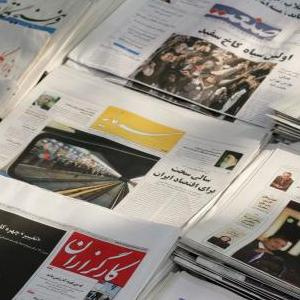Tehran's Daily Newspaper Review

Predictably, the Iranian dailies’ top headline was the trial of Husni Mubarak –blessed with the trite “Pharaoh” metaphor by the newspapers- in the Cairo Police Academy on Wednesday: “Pharaoh in cage” (Iran and Tehran-e Emrooz), “Egyptian dictator in courthouse cage” (Jomhouri-ye Eslami), “Pharaoh’s Historical Trial” (Kayhan), “Global reflection on the last pharaoh’s trial” (Resalat) and “Dictator on trial” (Shargh).
Iran blissfully published the headline “The government’s successful step in merging ministries”, as, unprecedentedly, Mahmoud Ahmadinejad's four candidates for governmental portfolios –three of them shaped out of a merger of seven ministries- gained the Majles’ vote of confidence. Since the launch of the Purposeful Subsidies’ initiative, 26 billion dollars of subsidies have been paid in cash to 73 million Iranians, the newspaper reported.
Egyptians do not believe in Mubarak’s “show trial”, according to Jomhouri-e Eslami. “Second batch of heavy crude oil also fails in stock exchange deal” the newspaper –highly critical of Ahmadinejad's economic policies- printed on the top right corner of the front page. The UN Security Council’s “failure” in approving an anti-Syria resolution, the “Turkish consul’s diplomatic retaliation against the Zionist Regime” in Moscow -low chair diplomacy redux (1, 2)- and the announcement of the top scorers of the intensely competitive national university entrance exam –the Konkour- were headlines of the newspaper.
Kayhan quoted Iran's Supreme Leader’s remarks in his meeting with Quran hafezs (memorizers), qarees (reciters), and experts. “With at least 10 million Quran memorizers Iran will turn into a steel nation,” Ayatollah Khamenei asserted. “In light of the Iranian nation’s move towards the Quran, it released itself from evil and advanced the country towards progress.” In Kayhan’s editorial, “US submits to trial, too”, Sa’dollah Zare’i stressed that Mubarak’s trial proves that Egyptians are not merely after reforms but a real transformation that jettisons the pro-West policies dominating Egyptian politics during Mubarak’s era.
Resalat spoke of Majles’ “big step” in converging with the government with its vote of confidence for Ahmadinejad's ministerial candidates. It also quoted Mahmoud Ahmadinejad as saying that the parliament’s vote of confidence facilitates the continuation in serving Iranians. Resalat also covered remarks by former minister in Rafsanjani’s cabinet and current chairman of Tehran's chamber of commerce, Yahya Al-e Es’haq, who had underlined the heavy price the Nezam has to pay for overreliance on imports. “Learn from Ameneh” was the title of newspaper’s editorial. The author criticized Mohammad Khatami's message to Ameneh Bahrami, acid attack victim who relieved her assailant from a retaliatory sentence, in which the president had spoken of the lessons society and politicians can learn from Ameneh’s forgiveness. It is the political system that has to forgive the Reformists, the author said, since it was they who had spilled acid on the face of the Nezam after the elections of 2009.
Shargh quoted a member of the minority Reformist bloc of the parliament who reported on the discussion inside the faction about participation in the next Majles elections. According to Sirous Sazdar, the bloc has decided to continue weighing the situation before making any decisions. “Strange days indeed” was the title of Shargh’s editorial, written by Ahmad Naghibzadeh, and which was a sentimental account of Mubarak’s fate.
Tehran-e Emrooz’s headline about the Wednesday vote of confidence was not as optimistic as other conservative media. “Cabinet completed after six months” the newspaper said, adding that Rostam Ghasemi, the new minister of oil, is the only new member joining the government. Tehran-e Emrooz also reflected Al-e Es’haq’s remarks about the 80 billion dollars of imports in 1389 [March 2009-March 2010], and an overreliance on oil revenues. Majles’ vote for four ministerial candidates proved that for the parliament qualifications and commitment are the only features that count, not partisan orientations, according to Tehran-e Emrooz’s editorial.
* Note: Vatan-e Emrooz does not publish on Thursdays.
Trouble with understanding some terms? Check our Glossary of Iranian Political Terms.
Briefing
Hamshahri (Citizen) is the official daily newspaper of Tehran's Municipality. Its general directions in politics, culture and economy are determined by the mayor of Tehran, currently Mohammad Baqer Qalibaf.
Iran is the official organ of the administration.
Jomhouri-ye Eslami (The Islamic Republic) was known as the official organ of the Party of the Islamic Republic, founded in 1979 and disbanded in 1987. Currently, it is an open critique of Mahmoud Ahmadinejad's policies and is known to be a mouthpiece of Akbar Hashemi Rafsanjani.
Kayhan (Universe) is a hard-line conservative newspaper. Its editor-in-chief –currently Hossein Shari’atmadari- is appointed by Iran's Supreme Leader. Shari’atmadari’s editorials often spark off controversy and debate inside Iranian political circles.
Khabar (News) is a principlist daily newspaper which adopts a critical stance towards Ahmadinejad's policies.
Resalat (Mission) belongs to the moderate wing of the principlist camp. Resalat’s best known analyst is Amir Mohebbian, its political editor.
Shargh (East) is a moderate reformist newspaper. It was the most popular and influential reformist newspaper in its first period of publication which lasted from August 2003 until September 2006.
Tehran-e Emrooz (Tehran Today) is a ‘principlist reformist’ newspaper, connected to Mohammad Baqer Qalibaf.

